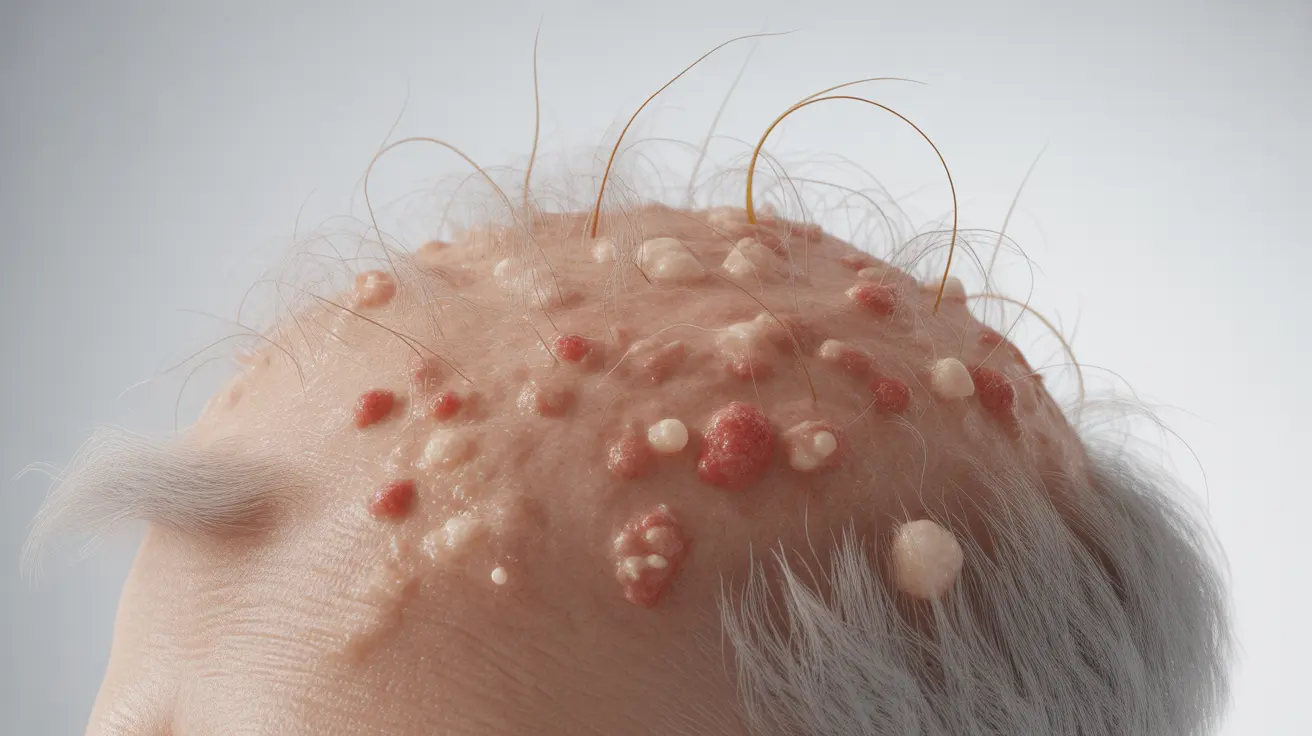Dealing with pimples on your scalp can be both uncomfortable and concerning. These pesky bumps, while hidden beneath your hair, can cause irritation, pain, and even affect your confidence. Understanding what causes scalp pimples and how to effectively treat them is crucial for maintaining a healthy scalp.
In this comprehensive guide, we'll explore the causes, symptoms, and various treatment options for scalp pimples, helping you identify the best approach for your specific situation.
Understanding Scalp Pimples and Their Causes
Scalp pimples typically develop when hair follicles become clogged with excess oil, dead skin cells, or product buildup. Several factors can contribute to their formation:
- Excess sebum production
- Bacterial growth
- Hormonal changes
- Poor hygiene practices
- Certain hair products
- Sweating during exercise
- Tight headwear
Common Symptoms of Scalp Pimples
Identifying scalp pimples correctly is essential for proper treatment. Here are the typical signs to look for:
- Red, inflamed bumps on the scalp
- Tender or painful spots when touched
- Small white or red pustules
- Itching or burning sensation
- Occasional scaling or flaking
Prevention Strategies
Taking proactive steps to prevent scalp pimples can significantly reduce their occurrence:
Proper Hair Care Routine
Maintain a consistent cleaning schedule that works for your hair type:
- Wash hair regularly to remove excess oil
- Use gentle, non-comedogenic products
- Avoid touching your scalp with dirty hands
- Clean hair tools and accessories regularly
Product Selection
Choose hair care products carefully to minimize the risk of scalp pimples:
- Use oil-free or non-comedogenic products
- Avoid heavy, greasy styling products
- Look for products containing salicylic acid or tea tree oil
- Consider fragrance-free options if you have sensitive skin
Treatment Options
Over-the-Counter Solutions
Several OTC treatments can effectively address scalp pimples:
- Medicated shampoos containing salicylic acid
- Tea tree oil-based products
- Zinc pyrithione treatments
- Gentle exfoliating scalp scrubs
Natural Remedies
Some natural approaches may help alleviate scalp pimples:
- Apple cider vinegar rinses
- Aloe vera gel
- Tea tree oil diluted with carrier oil
- Warm compress applications
When to Seek Medical Help
While most scalp pimples can be treated at home, certain situations warrant professional attention:
- Severe or persistent breakouts
- Signs of infection
- Intense pain or swelling
- Fever or other systemic symptoms
- No improvement with home treatment after several weeks
Frequently Asked Questions
- What causes pimples on the scalp and how can I prevent them?
Scalp pimples are typically caused by clogged hair follicles, excess oil production, bacteria, and product buildup. Prevention includes maintaining good scalp hygiene, using non-comedogenic products, and avoiding tight headwear that can trap sweat and bacteria.
- What are the common symptoms of scalp acne or pimples on the scalp?
Common symptoms include red or white bumps, tenderness or pain when touched, itching, inflammation, and occasionally scaling. These bumps may be filled with pus and can occur anywhere on the scalp.
- How can I treat scalp pimples at home using natural remedies and over-the-counter products?
Effective home treatments include using medicated shampoos containing salicylic acid, tea tree oil treatments, gentle exfoliation, and natural remedies like apple cider vinegar rinses. Over-the-counter products specifically designed for scalp acne can also be helpful.
- When should I see a doctor for persistent or severe scalp pimples?
Consult a healthcare provider if you experience severe pain, signs of infection, persistent breakouts that don't respond to home treatment, or if you develop fever or other systemic symptoms.
- Are certain hair products or habits more likely to cause pimples on the scalp?
Yes, heavy, oil-based products, frequent touching of the scalp with dirty hands, infrequent washing, and tight headwear can increase the risk of developing scalp pimples. Using non-comedogenic products and maintaining good scalp hygiene can help prevent breakouts.
Remember, maintaining a healthy scalp requires consistent care and attention to your hair care routine. By following proper hygiene practices and choosing appropriate products, you can effectively manage and prevent scalp pimples.




